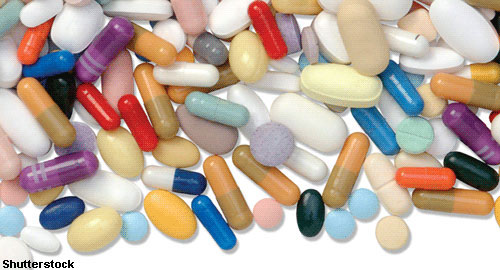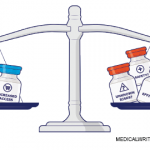 Increasingly, researchers are publishing the results of studies that examine the effect of switching from an immunologic to a biosimilar treatment. Among these is a report that infliximab and the biosimilar SB2 have similar efficacy, safety and immunogenicity profiles. Josef S. Smolen, MD, chairman of the Division of Rheumatology and Department of Medicine at the Medical University of Vienna in Austria, and colleagues published the results of their randomized, double-blind, Phase 3 transition study online Oct. 17 in the Annals of Rheumatic Diseases.1
Increasingly, researchers are publishing the results of studies that examine the effect of switching from an immunologic to a biosimilar treatment. Among these is a report that infliximab and the biosimilar SB2 have similar efficacy, safety and immunogenicity profiles. Josef S. Smolen, MD, chairman of the Division of Rheumatology and Department of Medicine at the Medical University of Vienna in Austria, and colleagues published the results of their randomized, double-blind, Phase 3 transition study online Oct. 17 in the Annals of Rheumatic Diseases.1
The study lasted for 78 weeks, during which the investigators did not identify any treatment-emergent issues or clinically relevant immunogenicity in patients with moderate to severe rheumatoid arthritis (RA) who were switched from infliximab to SB2 despite methotrexate treatment. The infliximab/infliximab and SB2/SB2 groups also maintained long-term efficacy, safety and immunogenicity.
“Our main goal was to demonstrate clinical comparability of switching from [infliximab] to SB2 with both ongoing reference infliximab, as well as SB2,” write the authors in their discussion. “This type of comparative approach may be considered unique in infliximab biosimilar studies done hitherto; for example, switching of [infliximab] to CT-P13 was compared with continuing CT-P13, but not with a parallel, continuing reference [infliximab] arm.”
The infliximab treatment group included 293 patients, 195 of whom were randomized at Week 54 to either continue infliximab or switch to SB2. At Week 30 and thereafter, patients were permitted a dose increase of infliximab or SB2. The study was fully blinded, including mock randomization procedures for the SB2/SB2 treatment group, with 201 patients mock randomized at Week 54. Patient disease characteristics were comparable at the time of randomization. The number and pattern of withdrawals were similar between the treatment groups.
The investigators documented the ACR20 responses between Weeks 54 and 78. These responses ranged from 63.5–72.3% with infliximab/SB2, 66.3–69.4% with infliximab/infliximab and 65.6–68.3% with SB2/SB2. They also measured Simplified Disease Activity Index (SDAI), Clinical Disease Activity Index (CDAI), ACR50 and ACR70 response rates—all of which were similar between treatment groups. The proportion of European League Against Rheumatism (EULAR) responses that were classified as good or moderate was also comparable at Week 78 across all treatment groups.
The researchers identified treatment emergent adverse events in 36.2%, 35.6% and 40.3% of patients in infliximab/SB2, infliximab/infliximab and SB2/SB2 groups, respectively. The most commonly reported treatment emergent adverse events were latent tuberculosis, nasopharyngitis and worsening RA. They documented infusion-related reactions in 3.2%, 2.0% and 3.5% of patients. When the investigators examined patients who were negative for anti-drug antibodies (ADA) up to Week 54, they found newly developed ADAs in 14.6% of patients in the infliximab/SB2 group, 14.9% of patients in the infliximab/infliximab group and 14.1% of patients in the SB2/SB2 group. These results suggest that immunogenicity after switching from infliximab to SB2 was similar to the immunogenicity of continuation with either treatment.



